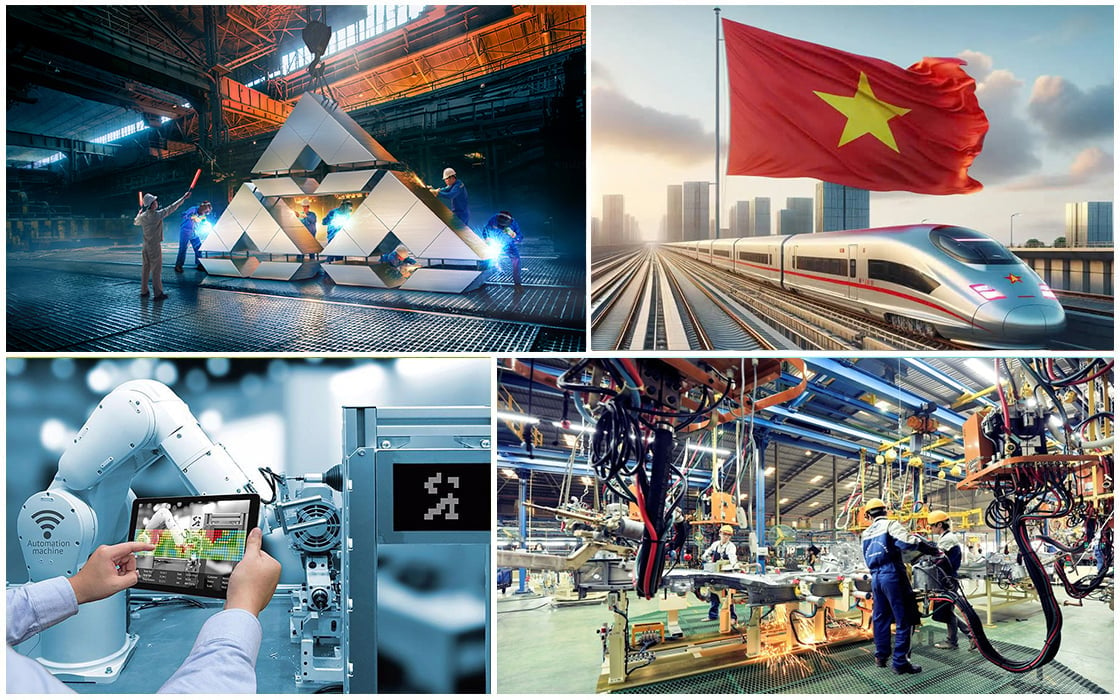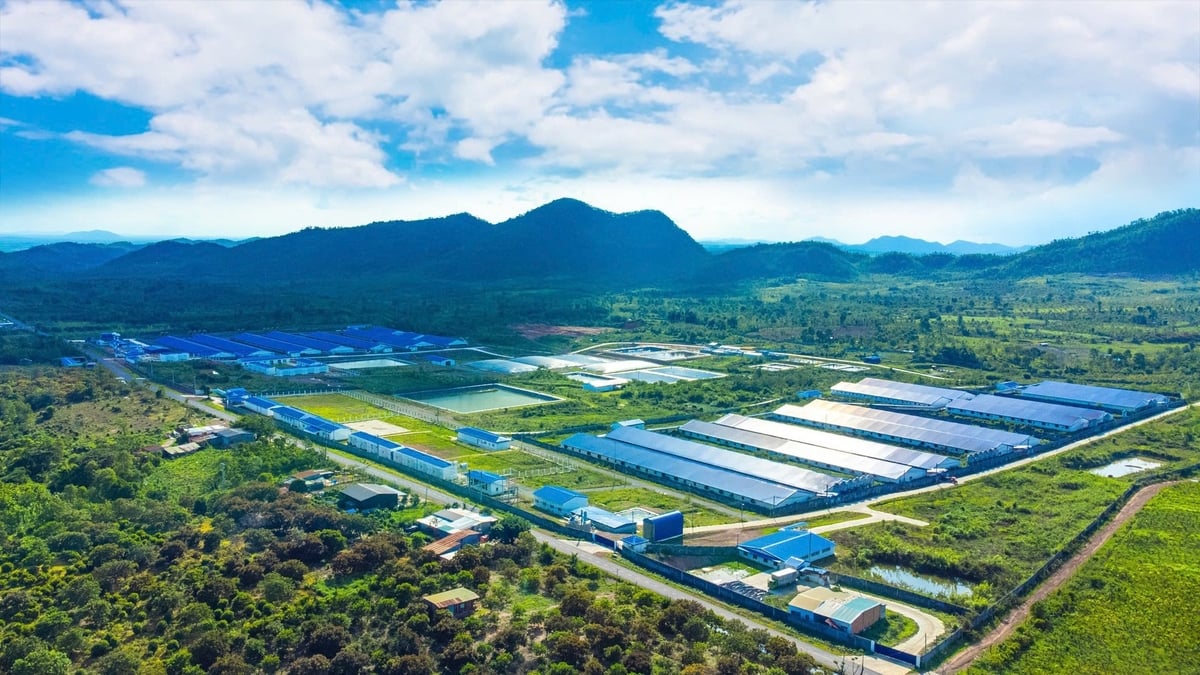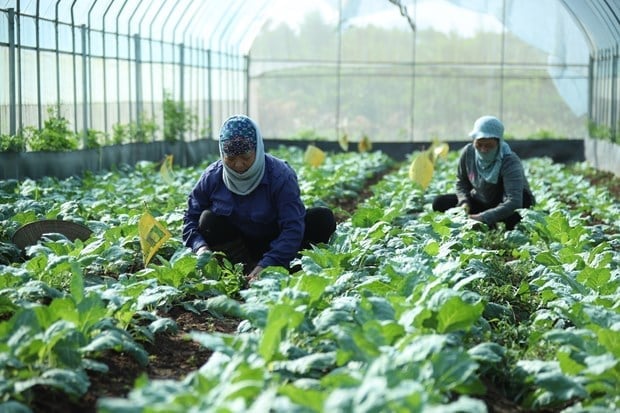June 7, 2025 | 10:16 GMT +7
June 7, 2025 | 10:16 GMT +7
Hotline: 0913.378.918
June 7, 2025 | 10:16 GMT +7
Hotline: 0913.378.918
On behalf of the Politburo, General Secretary To Lam signed Resolution No. 68-NQ/TW on May 4, 2025, regarding private economic development.
According to the resolution, after nearly 40 years of renovation, Vietnam's private economy has grown steadily in both size and capability. It has become one of the key drivers of the socialist-oriented market economy.
Currently, the private sector includes over 940,000 enterprises and more than 5 million household businesses. It generates about 50% of GDP, contributes over 30% of total state budget revenue, and employs roughly 82% of the national workforce. The sector is vital in driving growth, creating jobs, promoting innovation, raising labor productivity, boosting competitiveness, reducing hunger and poverty, and maintaining social stability. Many private businesses have expanded rapidly, built strong brands, and entered regional and global markets.

Beyond recognition, Resolution 68 also values and encourages entrepreneurship, affirming the role of businesspeople as "soldiers on the economic front." Photo: VGP.
However, the private sector still faces multiple barriers that hold back its development. It has yet to achieve breakthroughs in scale or competitiveness and still falls short of its expected role as the core engine of the economy. Most enterprises remain micro, small, or medium-sized. They often lack financial strength and sound management. Many struggle with outdated technology and weak innovation capacity. Labor productivity, efficiency, and competitiveness remain low. Business strategies often lack long-term vision, and connections with state-owned or foreign-invested enterprises are limited.
Several factors have contributed to this situation. Primarily, perceptions of the private sector’s role in the economy remain outdated and fail to meet current development needs. Institutional frameworks and legal systems still contain contradictions and gaps. Leadership and policy implementation have not received sufficient focus. Property rights and business freedom are not fully guaranteed. The private sector continues to face major challenges in accessing essential resources, especially capital, technology, land, materials, and skilled labor. Some preferential policies and support mechanisms remain ineffective or hard to access, while business costs stay high.
In order to realize the national development goals as set out in the Resolution of the 13th National Party Congress and meet the development requirements in the new era, it is necessary and urgent to innovate thinking, unify awareness and action, have comprehensive, comprehensive and breakthrough solutions to further promote the role of the private economy, strengthen confidence, create new momentum and impetus for economic development, promote growth and enhance national competitiveness.
From the above situation, the Politburo requests to focus on thoroughly grasping, drastically, synchronously and effectively implementing the following contents:
In a socialist-oriented market economy, the private economy is the most important driving force of the national economy, the pioneering force promoting growth, creating jobs, improving labor productivity, national competitiveness, industrialization , modernization, restructuring the economy towards green, circular, sustainable; together with the state economy and collective economy, the private economy plays a core role in building an independent, autonomous, self-reliant, and self-reliant economy associated with deep, substantive, and effective international integration, helping the country escape the risk of falling behind and rise to prosperous development.

Vietnam’s private economy has steadily expanded in both scale and quality.
Developing a fast, sustainable, effective and high-quality private economy is both a central and urgent task and a long-term strategic one; it needs to be specified in the country's development strategies and policies; in order to promote all potentials and strengths, liberate all productive forces, activate, mobilize and effectively use all resources, especially resources among the people, for socio-economic development, consolidate and strengthen national defense and security, enhance foreign affairs and international integration.
Completely eliminate perceptions, thoughts, concepts, and prejudices about Vietnam's private economy; properly assess the important role of the private economy in national development; nurture and encourage the entrepreneurial spirit and innovation of people and businesses, respect businesses and entrepreneurs, and identify entrepreneurs as soldiers on the economic front; fully ensure property ownership rights, freedom of business, equal competition rights, and freedom to do business in industries not prohibited by law; build and strengthen trust between the State and the private economic sector; protect the legitimate rights and interests of businesses and entrepreneurs; ensure that the private economy competes equally with other economic sectors in accessing business opportunities and resources of the economy, especially capital, land, technology, human resources, data, and other legitimate resources of the country in accordance with the law.
Create a business environment that is open, transparent, stable, safe, easy to implement, low cost, meets international standards, and ensures regional and global competitiveness. Timely develop and perfect laws, mechanisms, and breakthrough policies to encourage the private economy to develop in priority areas, invest in research and development, apply science and technology, innovate, digital transformation, participate in important, strategic tasks of the country and reach regional and world levels; promote the spirit of creative entrepreneurship, digital transformation, and legal and legitimate enrichment.
Strengthen the leadership role of the Party and the creation role of the State, taking enterprises as the center and subject; focus on training and fostering a team of entrepreneurs with ethics, business culture, courage, intelligence, dynamism, creativity, and striving to rise up; honor, encourage, and develop a strong team of entrepreneurs with patriotism, national pride, aspiration to contribute, respect for the law, and actively fulfill social responsibilities.
The Resolution sets the goal that by 2030, the private economy will be the most important driving force of the national economy; a pioneering force in the development of science and technology , innovation and digital transformation, contributing to the successful implementation of the goals of Resolution No. 57-NQ/TW, dated December 22, 2024 of the Politburo and other policies and guidelines of the Party.
Strive to have 2 million businesses operating in the economy, 20 businesses operating/1,000 people. Have at least 20 large businesses participating in the global value chain.
The average growth rate of the private economy is about 10 - 12%/year, higher than the growth rate of the economy; contributing about 55 - 58% of GDP, about 35 - 40% of total state budget revenue, creating jobs for about 84 - 85% of the total workforce; labor productivity increases on average about 8.5 - 9.5%/year.
Level, technological capacity, innovation, and digital transformation are among the top 3 countries in ASEAN and the top 5 countries in Asia.
Vision to 2045, Vietnam's private economy will develop rapidly, strongly, sustainably, proactively participate in the global production and supply chain; have high competitiveness in the region and internationally; strive to have at least 3 million enterprises operating in the economy by 2045; contribute about over 60% of GDP.

Substantial and effective support for small, micro and household businesses. Photo: VAN.
Accordingly, the Resolution also sets out 8 specific tasks and solutions:
Firstly, renewing thinking, reaching high consensus in perception and action, arousing national belief and aspirations, creating new impetus and new momentum to develop the private economy.
Second, promote reform, improve and enhance the quality of institutions and policies, effectively ensure and protect ownership rights, property rights, freedom of business, and the right to fair competition of the private economy, and ensure contract enforcement of the private economy.
Third, facilitate the private economy's access to resources of land, capital, and high-quality human resources.
Fourth, promote science and technology, innovation, digital transformation , green transformation, effective and sustainable business in the private economy.
Fifth, strengthen connections between private enterprises, private enterprises with state-owned enterprises and FDI enterprises.
Sixth, rapidly form and develop large and medium-sized enterprises and private economic groups of regional and global stature.
Seventh, provide substantial and effective support for small and micro enterprises and business households.
And eight, promote business ethics, promote social responsibility, strongly promote the entrepreneurial spirit, and create all favorable conditions for businessmen to participate in national governance.
Translated by Quynh Chi

(VAN) VAAS and numerous Vietnamese enterprises have signed cooperation agreements with Japanese partners to promote agricultural technology and trade connectivity.
/2025/05/29/5625-12-214801_567.jpg)
(VAN) Provincial mergers in the Mekong Delta promise to streamline administration, expand inter-provincial raw material areas, and foster close linkages in agricultural value chains, benefiting both businesses and cooperatives.

(VAN) Merging Mekong Delta provinces contributes to the expansion of agricultural raw material areas, addressing previous constraints caused by provincial boundaries. Additionally, this expansion will reduce costs and strengthen linkages between businesses, cooperatives, and farmers.
/2025/05/29/1043-2-153730_145.jpg)
(VAN) The Government's policy to merge provincial-level administrative units opens up major opportunities for the Mekong Delta region to reshape its agricultural development strategy toward large-scale production, effective regional linkages, and sustainability.

(VAN) The mutual export of agrifood products between the European Union (EU) and the United Kingdom (UK) must occur again without certification, border controls or other red tape. This was agreed at the UK-EU summit.
/2025/05/22/5121-2-173645_677.jpg)
(VAN) NBSAP Tracker identifies strengths and areas for improvement in the National Biodiversity Strategy, based on each region’s priorities and capacities.

(VAN) The draft amendment to the Circular on rice export trading stipulates a periodic reporting regime for rice exporting enterprises.